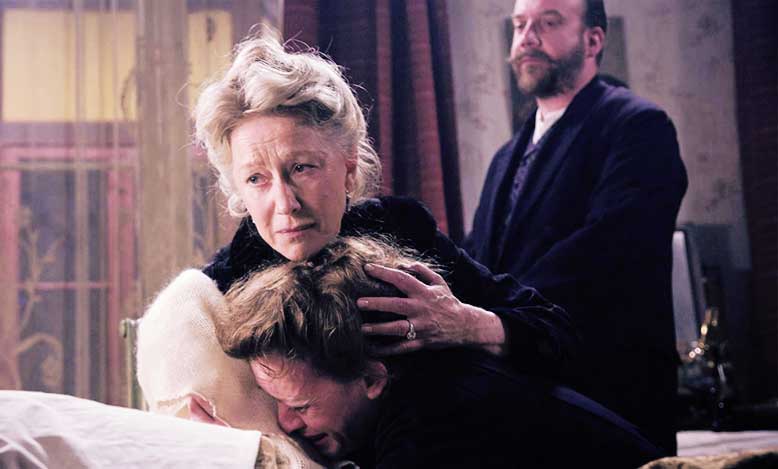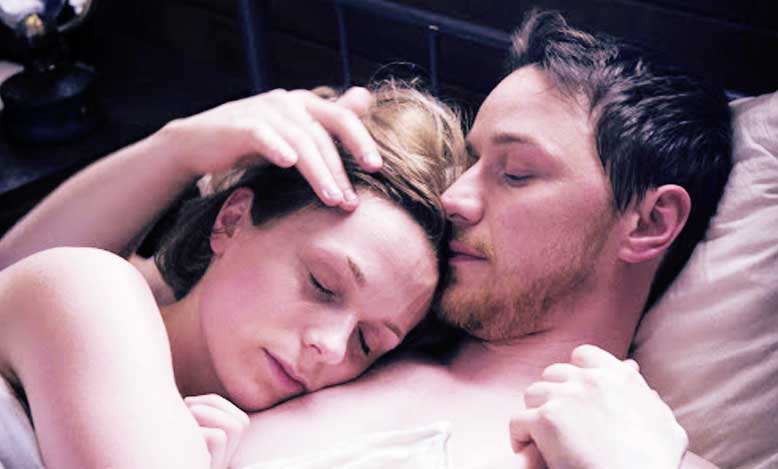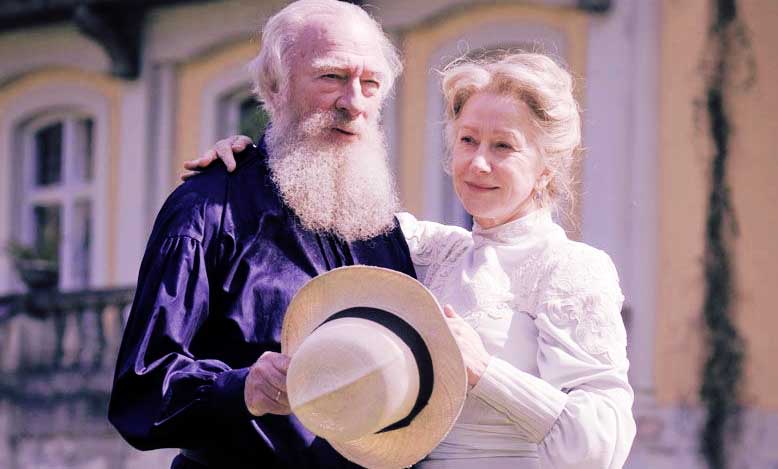This movie illustrates what happens when individuals in different Houses fail to understand each other. In The Last Station, about Leo Tolstoy’s last few months on earth, a ‘war’ breaks out between his wife Sofya and his friend, Chertkov, who built a religion around Tolstoy’s idealism and did not want him to deviate from it. Tolstoy, being a passive escape artist from his troubles, flees in the middle of the night to avoid the anger of his wife, who feels it is inappropriate for him to give away the rights to his books to “benefit Russia” and not take care of his children after he dies. Caught up in the middle of this crisis is Valentin, a young idealist, who must bear witness to this family’s upheaval and infighting. I find the different dynamics, explored through the traits shown by all the characters, and how they “ran into each other” by coming at the issue from cross-purposes, interesting.

Tolstoy is a Hufflepuff Primary. He believes in doing what is best for all, he believes in equality, he thinks he is doing good for the common man by giving up being an aristocrat and making money off his literary tomes. He just wants to live a quiet, peaceful life of happiness and commune with his fellow “equals,” in the Russian tradition of socialism. He goes about in plain peasant garb and rolls his eyes at the religion Chertkov built around him, because it’s taken his notions out of context, made rules out of his abstract philosophies (even he doesn’t abide by them – he kills mosquitoes, a clear disrespect of his desire to protect or preserve “all life”), and takes a genuine interest in everyone around him. It doesn’t matter to him, because they are all people. Equals, even to him, a famous author and aristocrat.
These behaviors, this decision to benefit the public welfare over his family, baffles his wife, Sofya, who is a Slytherin. To her, family comes first. If you are born to privilege, you stay there. What is this radical nonsense about abandoning your family in pursuit of “higher ideals”? She clashes with Chertkov because his Ravenclaw system is stupid to her – she sees it as immature, irresponsible, and deliberately stealing away what is rightfully hers and what belongs to her children – Tolstoy himself, his body, his mind, his heart, his presence—and the money his books would leave them. She also clashes with Tolstoy over his Hufflepuff sensibilities – because he prioritizes everyone else / the common man at the cost of his loved ones. She cannot understand that, because to her, family is all. She is loyal to her husband – fiercely so, and angry about him abandoning her for other people. She would never do that to him. Even after he has abandoned her and run away to die, she cannot let him go – she has to be there for him, for his last moments, to stay goodbye, to make sure he knows he is loved.
Chertkov is a Ravenclaw, who has ‘built’ Tolstoy’s legacy into a system of religious beliefs and principles he expects others to follow; he would put aside all else, to ensure Tolstoy lives and dies beneath the system’s ideals. A not-healthy Ravenclaw who excludes others from his system who refuse to respect or adhere to it, he even wants to deny Sofya the chance to say farewell, because confronted by her emotional persuasiveness, the passive Tolstoy might “reverse his beliefs” on his deathbed and prevent this new religion from spreading across Russia. He wants Tolstoy to die in a way that ‘fits’ their belief system – simply, humbly, and without renouncing his desire to ‘give all’ back to Russia. He has built socialism into his system — but does not allow emotions to touch him.

Valentin is also a Ravenclaw. He has adopted Tolstoy’s religious beliefs and ideals and strives to live up to them to the letter. As a younger, more eager, and more willing to shift his views Ravenclaw, Valentin is not above tweaking his system through his experiences. He puts love into it, to combat its coldness and distance from all things sensual or pleasurable, because he finds the act and emotions of being in love to be intoxicating. He thinks how they are treating Sofya is wrong –their system is hurting her, so he wants to shift it to include her wishes, because to do otherwise is wrong. He tries hard to live up to an ideal, to the standards set before him by others, to do no harm, to repress his sexual desires in accordance with his chosen views, and ultimately shows himself to be a true and healthy Claw.
Masha, his girlfriend and a Gryffindor, cannot understand this—why he would deny himself pleasure to live up to an ideal, why he cannot see the goodness in sensuality, why he caters to external rules. She finds them stupid, confining, and believes in listening to her instincts and her heart. They led her to the commune for a time, and then she decides to leave, because “this is not for me.” Her Gryffindor sensibilities found them too strict and distant from sensuality. They only resolve their romantic troubles as lovers when he’s able to include her in his beliefs, and she’s able to respect his desire to live by his ideals.
The movie shows the collision of perspectives – between Masha’s Gryffindor sensibilities and Valentin’s Ravenclaw higher principles; between Tolstoy’s Hufflepuff societal-focused values and his wife’s family-driven Slytherin loyalties; between Chertkov’s Ravenclaw desire to spread a new religion and Tolstoy’s Hufflepuff disregard of its rigidity; between Valentin’s softer, more heartfelt idealistic Ravenclw, and Chertkov’s more transformative Ravenclaw. They cannot understand each other, their motivations, their desires, or their mindset, and so they clash in an epic battle of “wills.”
In a weird way, I think this ‘system’ of sorting people and understanding their motivations is almost as useful as some of the more complex ones, such as MBTI or Enneagram. (That being said, Tolstoy is an ENTP 9w1, his wife is an ESFJ 2w1, and Valentin is an INFP 9w1.)

This is making me wonder how much of the interpersonal conflict brought on by different perspectives can be resolved by explaining and understanding those perspectives, and how much of it … can’t.
Because I know in my own life, when I try to understand somebody else’s perspective through understanding their type, it often does help me see the validity of their way of thinking. ie, “Okay, this person is a Ravenclaw convinced of the rightness of their own system and ideals. So even if those ideals are opposite to mine, they still see themselves as right.”
But I think there are some chasms between belief systems and motivations that are so deep, no amount of explaining can make them each see the other as valid.
Like even if you explained to Tolstoy’s wife that Chertkov is a Ravenclaw, an idealist, and that’s why he’s doing what he’s doing, she’d be like, sarcastically, “Well, jolly good for him,” but she’d STILL fight him as hard as ever. Because understanding doesn’t always equal saying “this is okay, this is fine with me.”
That’s why about half the time, I don’t argue with people. I know it’s pointless. Because everyone think they are right, very few have formed no opinion before you speak to them, and it’s a waste of my frustration to attempt to convince them to change their mind. It doesn’t stop me from arguing all the time, but it does keep me from being frustrated sometimes. I used to more militantly want people to live according to my Ravenclaw system and principles, and I admit: I still think it’s “right” and “the better way to be,” so I get Cherkov’s immature posturing. But… what he’s doing is wrong in my eyes. He’s taking advantage of Tolstoy, he’s coming in-between a man and wife (a big NOPE), and he’s causing unnecessary chaos and division within their lives for “the greater good.” But the end does not justify the means. How you get somewhere matters.
The best the Houses can do is try and get where the other one is coming from, learn to explain why they think what they do in a way that doesn’t seem like bullying or arguing, and then agree to disagree sometimes… or, in a marriage, to compromise. What about just giving the profits off ONE book to the commune and letting the children have the rest, for example? Compromise is nobody gets everything, but everyone gets something, and it would have benefited them all in this situation.
Yes, I think Chertkov is wrong because he’s saying his ideals are MORE IMPORTANT than the welfare of individual people, and I’m a Hufflepuff so for me /that’s/ a big “nope.” Arrogance, callousness, will undermine even the best belief system.
Compromise definitely helps, yes. Although I think there’s also a need for us to understand that … not everyone is willing to compromise with us, not every conflict is amenable to compromise, and sometimes it’s just got to be like “okay, I see where you’re coming from but I still can’t agree with any part of it, so we’ll keep fighting for each of our beliefs, and may the best man win.”
Thinker types need to be careful to involve a moral system in whatever Ravenclaw system they construct, otherwise they become too rigid and militant. It’s better if all of them can adhere to their chosen value system, but also involve the flexibility and spiritual growth to tweak it as they go along (keep things, discard things — be like Luke Skywalker, and put some Love into the Jedi Code).
That is very true. Not everyone wants to play nice and in that case, you can either walk away or … carry the bigger bat. 😛
That’s a good point. A moral code is important for everyone, even though it may come a little easier to feelers than thinkers.
HA. Yes. Much of life’s wisdom is knowing when to walk away vs. when to bring out the Big Guns. 😛